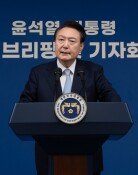[Editorial] North Korea Uses Delaying Tactics at Six-Party Talks
[Editorial] North Korea Uses Delaying Tactics at Six-Party Talks
Posted August. 30, 2005 06:50,
A government official announced yesterday that the fourth round of the six-party talks, which is expected to resume this week, will be postponed for a short while. Though there was no word on the reason, many believe that the delay stems from the remaining differences between North Korea and the U.S. regarding a range of issues, including the Norths right to use nuclear energy for peaceful purposes.
South Korean Foreign Minister Ban Ki-moon said, I hope the talks will resume as early as the middle of next month. However, some people expressed concerns that the resumption of the talks itself is highly uncertain. If the six-party talks that resumed after a painful 13-month impasse stall again, the situation on the Korean peninsula and in Northeast Asia could deteriorate due to heightened tension.
North Korea should immediately return to the negotiation table. It should not use the appointment of a U.S. special human rights envoy to North Korea or the Ulji-Focus Lens exercise as an excuse to withdraw from the talks. The appointment of a special human rights envoy has long been scheduled and the joint military exercise is an annual event that has been conducted since 1976. In addition, all the related parties are maintaining a position that they will respect the Norths right to peaceful use of nuclear energy if it successfully gains trust from the international community by rejoining the global regime of the Nuclear Non-Proliferation Treaty (NPT).
North Korea should acknowledge that the current situation where it is not given the right to peaceful use of nuclear energy, which all the NPT member countries are entitled to, is one of its own making. In the past, the North withdrew from the NPT and developed a nuclear weapons program violating the Geneva Agreed Framework. Under such circumstances, it is understandable that no one wants to trust the country.
It seems that such a lack of confidence in North Korea led the U.S. to the decision that it will recognize a countrys right to peaceful use of nuclear energy according to the level of its democracy.
The South Korean government should also make its position on the issue clear. It has joined the North in stressing just the two of us in resolving the nuclear issue while maintaining an ambivalent attitude between the North and the U.S. It is time to seriously dwell upon whether such an attitude sends the message to the North that it can count on the South, and serves as the reason for North Korea to drag its feet. Then we should take a two-pronged approach that we together with the U.S. should make efforts to persuade the North to return to the negotiation table on one hand, and put pressure on it on the other hand. The carrot approach in the name of cooperation between the two Koreas alone is not enough to resolve the North Korea nuclear crisis.
Headline News
- Harris ‘first female president’ vs. Trump ‘again 2016’
- N. Korea builds 11-meter rampart after road demolition
- Democratic Party eventually agrees to abolish financial investment income tax
- Drug smuggling is seized twice a day on average this year
- Surrounded by ‘uniforms,’ NHL’s first female coach ‘time-out’







